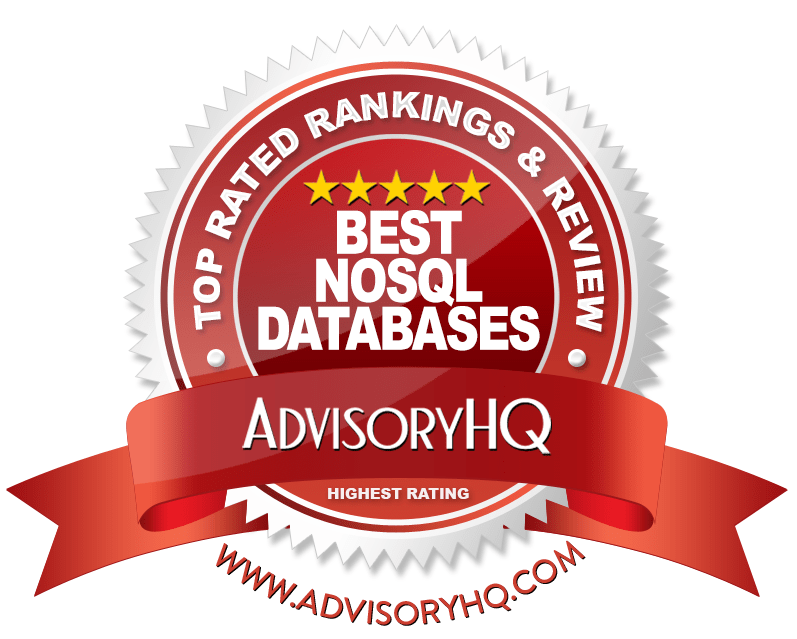2017 RANKING & REVIEWS
TOP RANKING NOSQL DATABASES FOR PROJECT MANAGEMENT
The Growing Popularity of Non Relational Databases
NoSQL is the current big data buzzword that stands for “Not Only SQL,” pronounced “sequel.”
For a long time, relational databases using SQL (Structured Query Language) were the standard, but this model has run into problems. Today, we’re collecting, storing, accessing, and analyzing an unprecedented amount of data, and there is a huge emphasis on scalability through cloud computing.


 Award Emblem: Top 6 Best NoSQL Databases for Your Project Needs
Award Emblem: Top 6 Best NoSQL Databases for Your Project Needs
But unlike SQL, it’s a little more challenging to lump NoSQL technologies into one definition. As Simplilearn observes, there are several common features of NoSQL:
- Not based on the relational model
- Runs well on clusters
- Predominantly open-source
- Built for Internet 2.0
- Schemaless databases
NoSQL is not a perfect classification, but NoSQL technologies are preferred for databases because of their flexibility and their horizontal scalability compared to relational databases. NoSQL also prioritizes performance.
See Also: Best Property Management Software | Ranking | Property Management Software Reviews
AdvisoryHQ’s List of the Top 6 NOSQL Databases
List is sorted alphabetically (click any of the database names below to go directly to the detailed review section for that NoSQL database)
AdvisoryHQ’s List of the Top 6 Best NoSQL Databases | Brief Comparison
Top Non-Relational Databases | Highlighted Features |
| Cassandra | Configurable consistency levels |
| CouchDB | Provides foundation for offline first applications |
| HBase | Optimized for reads |
| MongoDB | Support multiple storage engines |
| Neo4j | Suitable for social networks, recommendation systems |
| Redis | Top database for caching |
Table: Top 6 Best NoSQL Databases | Above list is sorted alphabetically
The Four Categories of NoSQL Databases (Understanding the Top NoSQL Databases)
NoSQL databases fall into four main categories or data models. Each kind of NoSQL database is suitable for different needs.
- Key-value NoSQL databases
- Document NoSQL databases
- Column-oriented NoSQL databases
- Graph NoSQL databases
TechTarget provides helpful explanations of the features and benefits of the different kinds of schemaless databases.
Key-Value NoSQL Database
- Good for applications with frequent small reads and writes
- Good for applications with simple data models
- Typically stores simple scalar values
- Has simple query facilities
- Values are looked up using a key
- Good for speed
Document NoSQL Database
- Flexible
- Accommodates varying attributes with significant amounts of data
- Supports embedded documents
- Indexing and filtering capabilities
- Popular for user-friendliness, flexibility, and performance
Column-Oriented NoSQL Database
- Suited for large volumes of data
- Lots of read and write performance
- Run on clusters
- Appropriate for data that requires multiple servers
Graph NoSQL Databases
These kinds of NoSQL databases are well-suited for scenarios where there are connections between entities. Examples include:
- Network and IT infrastructure management
- Identify and access management
- Products and services recommendations
Different NoSQL technologies are suitable for different scenarios and project needs. The NoSQL databases on our list of the best NoSQL databases will fall into one of these four categories. The databases included on our list are some of the fastest NoSQL databases and are among the best NoSQL solutions.



Source: Pexels
All-in-One Change Management Tools
Top Rated Toolkit for Change Managers.
Get Your Change Management Tool Today...
AdvisoryHQ’s Selection Methodology
What methodology does AdvisoryHQ use in selecting and finalizing the credit cards, financial products, firms, services, and products that are ranked on its various top rated lists?
Please click here “AdvisoryHQ’s Ranking Methodologies” for a detailed review of AdvisoryHQ’s selection methodologies for ranking top rated credit cards, financial accounts, firms, products, and services.
Detailed Review – Top Ranking Best NoSQL Databases
Below, please find the detailed review of each of the NoSQL databases on our list of the top NoSQL databases. We have highlighted some of the factors that allowed these schemaless databases to score so well in our selection ranking.
Cassandra Review
Apache Cassandra is a free and open source NoSQL database. It’s one of the most popular NoSQL databases. Released in 2008, Cassandra was designed by Facebook to initially power its inbox search feature.
No Single Point of Failure
One of the distinctive feature of this schemaless database is its decentralized structure. This NoSQL database has no single point of failure, distributing data across the cluster so that each node holds different pieces of data.
This ensures that Cassandra can stay running during failures, making it one of the top NoSQL databases.
Scalable
Cassandra is one of the top NoSQL databases not just because it does not have single points of failure, but because it can read and write data extremely well. Cassandra is one of the popular NoSQL databases that can scale horizontally since its read and write performance is consistent at different sizes.
Its ability to make growth so easy makes Cassandra one of the most popular NoSQL databases.
Configurable Consistency Levels
Cassandra’s consistency can be tuned depending on the situation. This flexibility is one of the many reasons this is considered one of the best NoSQL databases.
Data in this most popular NoSQL database is stored across multiple nodes. That concept is referred to as the replication factor. As DataScale explains, if you want to have a piece of data stored on three nodes in your cluster, you would configure a replication factor of three.
Naturally, replicating that pieces of data within your non-relational database takes a bit of time, and you may not need to wait for that piece of data to land in all the nodes.
In order to make things move faster, the consistency can be adjusted. If a client does not need all of the nodes to be filled before moving on to the next task, then the consistency of the NoSQL database can be adjusted to a lower level, thereby increasing the speed.
Hybrid Data Model
Cassandra, which is among the popular NoSQL databases, is a mix between two of the data models. As one of the fastest NoSQL databases, Cassandra combines the key-value and column-oriented models.
Don’t Miss: Mint.com Review | What You Should Know About Mint Software
CouchDB Review
CouchDB is one of the popular NoSQL databases that uses a document data model. Its architecture emphasizes user-friendliness and accessibility across the web. This non-relational database makes it easy for users to access the data they need from anywhere thanks to its Couch Replication Protocol. Data can be stored on a personal device or in the cloud.
Seamless Data Flow
Data can be safely stored in the cloud or on a user’s mobile device using this NoSQL database. The Couch Replication Protocol makes it easy for data to move with ease between web browsers, service clusters, and mobile phones.
Choice Between Single Node or Cluster
CouchDB can work as a single node or clustered NoSQL database. A leader among popular NoSQL databases, CouchDB provides the option of starting with their simpler, single-node schemaless database. When the need arises, users can transition to higher capacity clustered database and no APIs are changed.
HTTP and JSON Compatible
As one of the best NoSQL databases, CouchDB is compatible with any software that supports HTTP protocol and the JSON data format. External tools are also compatible with this NoSQL database including load balancers and HTTP proxy servers.
Provides Foundation for “Offline First” Applications
Even in highly developed countries, lack of data connectivity is a persistent problem. There are areas with zero reception, capacity problems, and more. All you have to do is think about your inability to access Wi-Fi or cellular data while riding the train to work.
This has spurred an interest in developing offline capabilities for both web and native applications.
CouchDB is one of the NoSQL technologies that account for this. It’s distinctive Replication Program serves as “the foundation for a whole new generation of “Offline First” applications.”
Related: Review of E-file Online Tax Software (E-file Reviews)
HBase Review
HBase is one of the column-oriented, key-value NoSQL databases. As InfoWorld describes it, this NoSQL database:
- Is extremely scalable
- Is highly reliable
- Has a flexible schema
- Optimized for read performance
Writes are slower, but this is because HBase is catered more for reads. This NoSQL solution can easily go through large amounts of data to find the small useful pieces of data that are needed.
HBase does not have varying consistencies the way some other NoSQL technologies do. HBase outlines the following features of its NoSQL database:
- Linear and modular scalability
- Consistent reads and writes
- Sharding of tables is automatic and configurable
- Failover support between RegionServers is automatic
- User-friendly Java API for client access
- Real-time queries supported by block cache and Boom Filters
- Support for exporting metrics
This NoSQL database’s model is made up of rows identified by a row key. Row keys are used to guide data sharding — that’s the way data is spread out through the cluster. The sort order of the table rows is also determined by the row keys. This is why the row keys are so important in this NoSQL database.
Key/value pairs make up each row in this NoSQL database. The key is what identifies a column and the value is the content of a specific cell (that lies between a particular row and a particular column).
Although Cassandra was initially developed for Facebook’s Inbox Search, the social networking giant migrated over to HBase in 2010.
MongoDB Review
MongoDB is a document-oriented NoSQL database. It is one of the free and open source NoSQL technologies. MongoDB was initially developed to be part of a SaaS product, but it moved its development model to open source in 2009. It is one of the most popular NoSQL databases.
There are specific benefits for using documents:
- They correspond to native data types in various programming languages
- Need for expensive joins is reduced
- Dynamic schema
High Performance
Input/output activity is reduced thanks to support for embedded data models. Faster queries are supported by this NoSQL database and the keys from arrays and embedded documents can be included.
Rich Query Language
A rich query language is supported in order to bolster read and write operations in addition to text search, geospatial queries, and data aggregation.
Horizontal Scalability
Scalability is a high priority functionality for MongoDB. In fact, they refer to it as this NoSQL database’s core functionality.
Multiple Storage Engines are Supported
MongoDB supports many storage engines, including:
- WiredTiger Storage Engine
- MMAPv1 Storage Engine
Popular Article: Best Retirement Planning Software and Tools for Individuals
Neo4j Review
Neo4j is a graph NoSQL database. It falls into the category of NoSQL databases with native graph storage and native graph processing. It is also distinctive for being ACID-compliant. NoSQL technologies are known for typically not being ACID-compliant.
ACID stands for Atomicity, Consistency, Isolation, and Durability.
What Kinds of Projects Is Neo4j Most Suitable for?
Neo4j is the best NoSQL database for capturing relationship data. It can also capture the nuances of data. For instance, it not only can represent who knows who in a social network, but it can also ascertain things like how long they’ve known each other and the mutual friends they share.
It’s also the best NoSQL database for trends and similarities. If you want to understand where people in a network enjoy shopping or eating, among the top NoSQL databases, this is the one for the job.
Of course, this doesn’t mean that this NoSQL database should be limited to data management for social media sites and e-commerce platforms. Among the popular NoSQL databases, Neo4j is suitable for any collection of data where there are relationships or connections. InfoWorld provides the following great examples:
- Social networking
- Recommendations systems
- Asset management
- Network management
- Master data management
- Identity-based account control
Neo4j is written in Java. This NoSQL database is available in both embedded and server forms.
The embedded version of this NoSQL database is best for niche applications that are smaller while the server version is best for those handling multiple clients.
Redis Review
Redis is a key-value NoSQL database and is considered to be one of the most popular NoSQL databases, if not the most popular. Redis stands for REmote DIctionary Server.
The Best NoSQL Database for Caching
Among the top NoSQL databases, Redis is considered the best NoSQL system to use as a cache for its durability and efficiency. Redis uses a specific process called data eviction to make space for new data.
Compared to other NoSQL databases, Redis provides more nuanced control over data evictions. Users can choose from six different data eviction policies. Individuals using this NoSQL database can also choose to take either an active or a passive approach to data eviction. It can either be removed proactively or on an as-needed basis.
Redis also offers much-needed flexibility when it comes to the objects that users can cache. Key names and values can be up to 512 MB each, and there are five data structures that can be selected in this NoSQL database.
Redis’s ability to optimize several tasks equals enhanced performance. This NoSQL database can also replicate its data. And to make the operational experience easier, Redis makes it easy to view metrics, monitor usage, track usage, and notice abnormal behaviors.
Read More: Top Money Management Software and Apps for All Devices (Rankings)
Conclusion – Top 6 Best NoSQL Databases
Today’s world is filled with a gigantic amount of data. User data, customer data, financial data, consumer data, medical data — the list goes on and on. There is no way we need all of it, but we never know when we may need some of it. As a result, coming up with effective data management systems and tools is necessary.
Since so much data is being collected, it is simply unsustainable to require all of this data to fall into perfect, pre-defined categories. A need for flexibility has prompted the switch from relational databases, which are rigid, to non-relational databases, which are more flexible.
This is why companies are looking for the fastest NoSQL databases and the top NoSQL databases.



Image Source: Pexels
Non-relational databases, also known as NoSQL databases, are not only scalable but flexible as well. They enable companies to comfortably grow and still collect data on a larger scale. In our cloud-based future, NoSQL technologies are becoming the way to go.
AdvisoryHQ (AHQ) Disclaimer:
Reasonable efforts have been made by AdvisoryHQ to present accurate information, however all info is presented without warranty. Review AdvisoryHQ’s Terms for details. Also review each firm’s site for the most updated data, rates and info.
Note: Firms and products, including the one(s) reviewed above, may be AdvisoryHQ's affiliates. Click to view AdvisoryHQ's advertiser disclosures.









